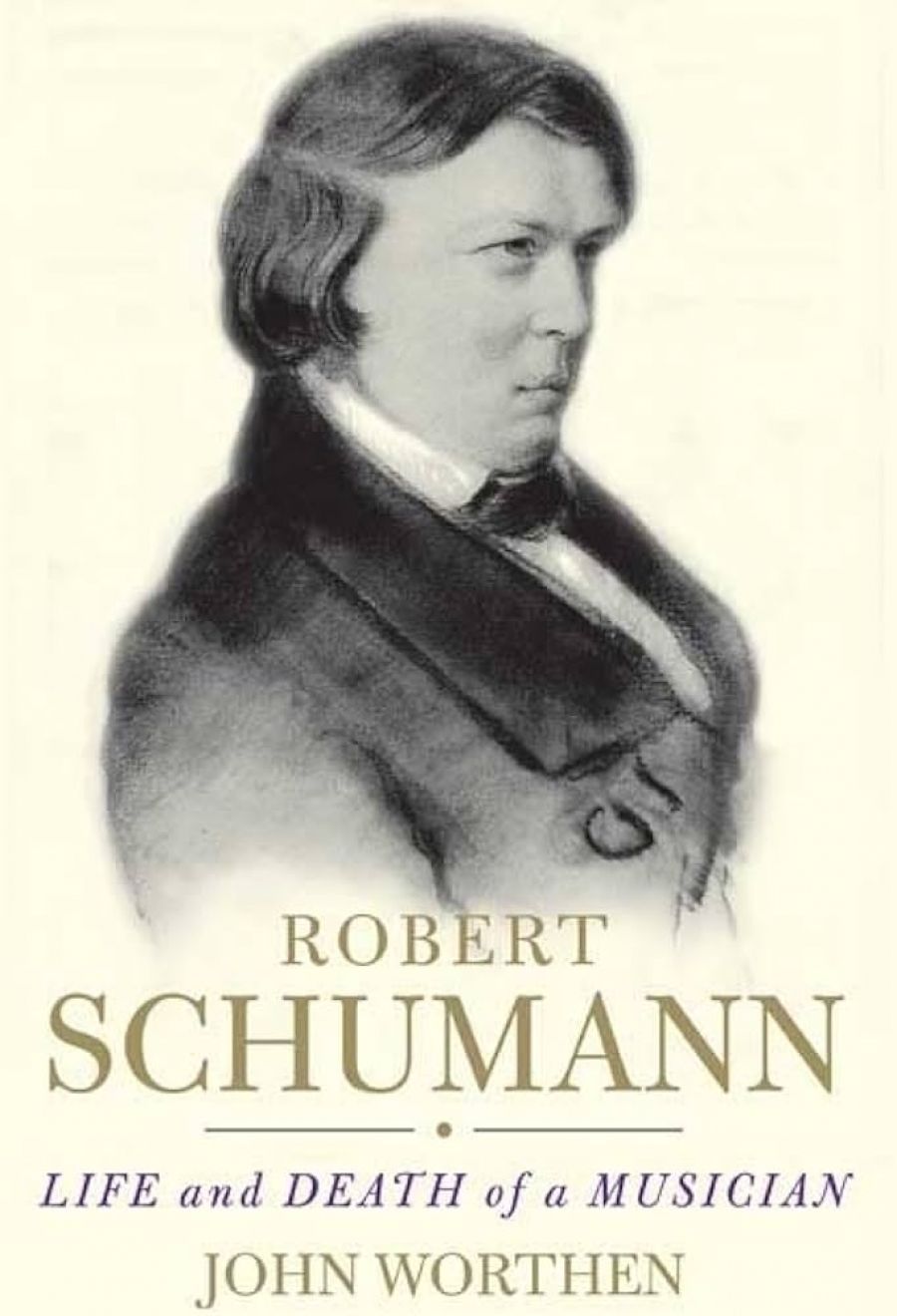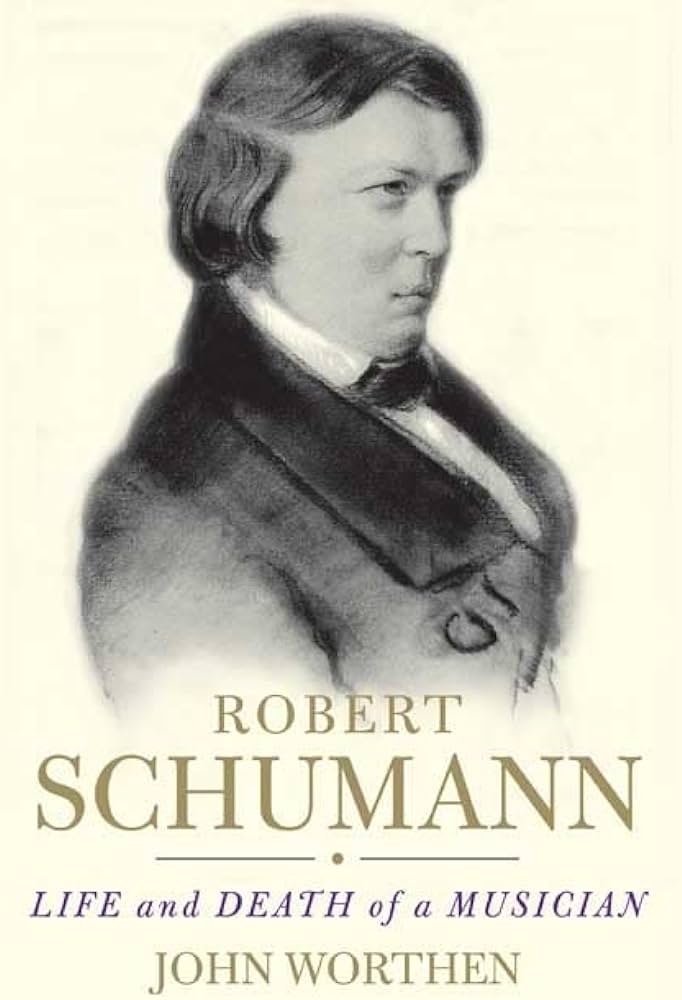
- Free Article: No
- Contents Category: Biography
- Custom Article Title: A sad case?
- Review Article: Yes
- Article Title: A sad case?
- Online Only: No
- Custom Highlight Text:
Does it matter whether Robert Schumann suffered a slow, passive and continuous decline towards the madness of his last two years or, as John Worthen strongly affirms, a sudden descent into psychosis after a creative lifetime marked by personal resilience and determination? Many people would argue that it is particularly important in music not to let biography get in the way of hearing what the composer has created in sound, if for no other reason than that it could hinder music’s special freedom to mean quite different things to different listeners.
- Book 1 Title: Robert Schumann
- Book 1 Subtitle: Life and death of a musician
- Book 1 Biblio: Yale University Press, $75 hb, 496 pp
- Book 1 Cover Small (400 x 600):

- Book 1 Cover (800 x 1200):

Worthen, author of studies of D.H. Lawrence (2005) and the Wordsworthians (2001), clearly wishes to correct what he claims to be such distortions in widespread perceptions of Schumann’s life and, therefore, of his trajectory as an artist. The sources Worthen has at his disposal contain a few substantial gaps but are, in general, unusually copious. Both Schumann and Clara wrote numerous letters in a highly developed and self-aware manner. They kept diaries and contributed to a joint household journal registering something of the weekly temperature of their marriage. Arguments over the interpretation of diary entries and other personal statements can be expected to continue, but Worthen seems on strong ground when he refers to points of agreement between Schumann’s assessment of himself as resolute, optimistic and resilient and his actual achievements.
Schumann was one of three nineteenth-century composers of very high rank – the other two being Berlioz and Wagner – whose youthful interests and inclinations, nurtured in middle-class or cultivated professional households, were as much literary as musical, and who were relatively late starters in finding their musical destiny. Berlioz and Wagner eventually achieved their own kinds of widely acknowledged musical mastery; Schumann, in contrast, has sometimes been characterised as remaining a wonderfully gifted musical amateur, not quite realising in full the flair so self-sufficiently evident from an early age in his keyboard improvisations and the piano pieces, songs and symphonic and chamber works of the late 1830s and early 1840s. Against this estimate can be cited the sustained piano practice that, at one time, persuaded Clara’s father, the keyboard pedagogue Friedrich Wieck, that Schumann could become one of the leading piano soloists of his day. Other signs of professionalism are Schumann’s consistent development of contrapuntal skill through his study of Bach, the continually increasing scope of his musical thought and the originality of form and style with which his symphonies, for example, exerted influence on some of his principal contemporaries and successors.
Support for Schumann’s estimate of himself as strong-minded and steadfast comes from his behaviour in a number of crises in his life, not least from his demonstrated ability to stand up to the public hostility of Friedrich Wieck during the years in which that individual turned from father figure to bitter adversary, using widely circulated defamatory statements and legal delays to block Schumann’s marriage to the jealously guarded Clara, who had been trained from childhood to be her father’s musical ticket to fame and affluence. (One strong argument against the claim that Schumann had revealed symptoms of mental unbalance in his earlier years is that Wieck would not have hesitated to name such symptoms among his published objections to Schumann as a husband for his daughter.) Schumann was one of the co-founders of a new music journal in Leipzig, produced no less frequently than twice a week and sometimes largely written by him. He single-handedly fought off an attempt by a local publisher to buy out the journal, in the process becoming its sole owner and editor and turning it into the famous Neue Zeitschrift für Musik. His creative output was anything but that of a dilettante. It developed from the floods and famines of his earlier years into an almost incessant professional activity, encompassing the principal instrumental genres, major choral works of high quality (Paradise and the Peri and the Scenes from Faust) and an opera, Genoveva, in which the drama may be notably defective but much of the music is worth prolonged familiarity.
Schumann’s love affairs were a robust aspect of his life. He recorded his acts of married intercourse with Clara with a special symbol in his diaries (a tick with a double horizontal tail) and started ten pregnancies with her, out of which eight children survived beyond their first year. (Clara still managed, remarkably, to give an average of ten concerts a year during her married life.) It may startle some people’s sensibilities to learn that Schumann had a very regular sex partner, possibly a servant of some kind and usually identified as Christel, while he was trying to win the battle with Wieck to marry Clara. This consolation led to his contracting syphilis. After prompt visits to a doctor, he seemed cured by the standards of the day; and there is no suggestion, apparently, that he passed on the disease to Clara or their children.
His medical treatment for syphilis has been blamed, through its supposed use of mercury, for the numbness that developed in the middle finger and forefinger of his right hand, ending his hopes of becoming a celebrated pianist–composer; but Worthen points out that the treatment was not mercury-based and emphasises the likelihood that the partial culprit, aggravating a longstanding weakness, was a device that placed fingers in opposition to a spring in the hope of strengthening them. Schumann’s response to this blow to his hopes for a career as a pianist–composer, incidentally, can be cited as another instance of his capacity to survive and adapt to a major disappointment. Neither Schumann nor the doctors who treated him understood the relationship of an initial syphilitic infection to its later phases. Although Schumann’s diaries and other sources record a long series of his aches and pains in later years, the essence of Worthen’s thesis is that Schumann’s final illness was the unexpected and abrupt manifestation of syphilis in its extreme tertiary phase. In arriving at this disastrous final stage, Schumann joined a woeful array of prominent nineteenth- and early twentieth-century composers that included Smetana, Donizetti, Wolf and Delius, while omitting such short-lived sufferers from syphilis as Schubert.
Worthen’s biography is clearly and persuasively written. His book vividly communicates the growth in the child Clara’s love for her nearly nine-years-older fellow student through listening, Desdemona-like, to his fanciful stories and conversation. Schumann once remarked in wonderment, when he was still in the elder-brother stage of the relationship, that Clara seemed to have remembered every word he ever said to her. He was unusual in writing imaginative music for children and, pleasingly, fully lived out his musical attentiveness to them with his own large family. Worthen’s book, whether you accept all of its arguments or not, has a quality shared by all good biographies of creative artists. It makes you eager to revisit Schumann’s music, especially those pieces you might have neglected or undervalued.


Comments powered by CComment